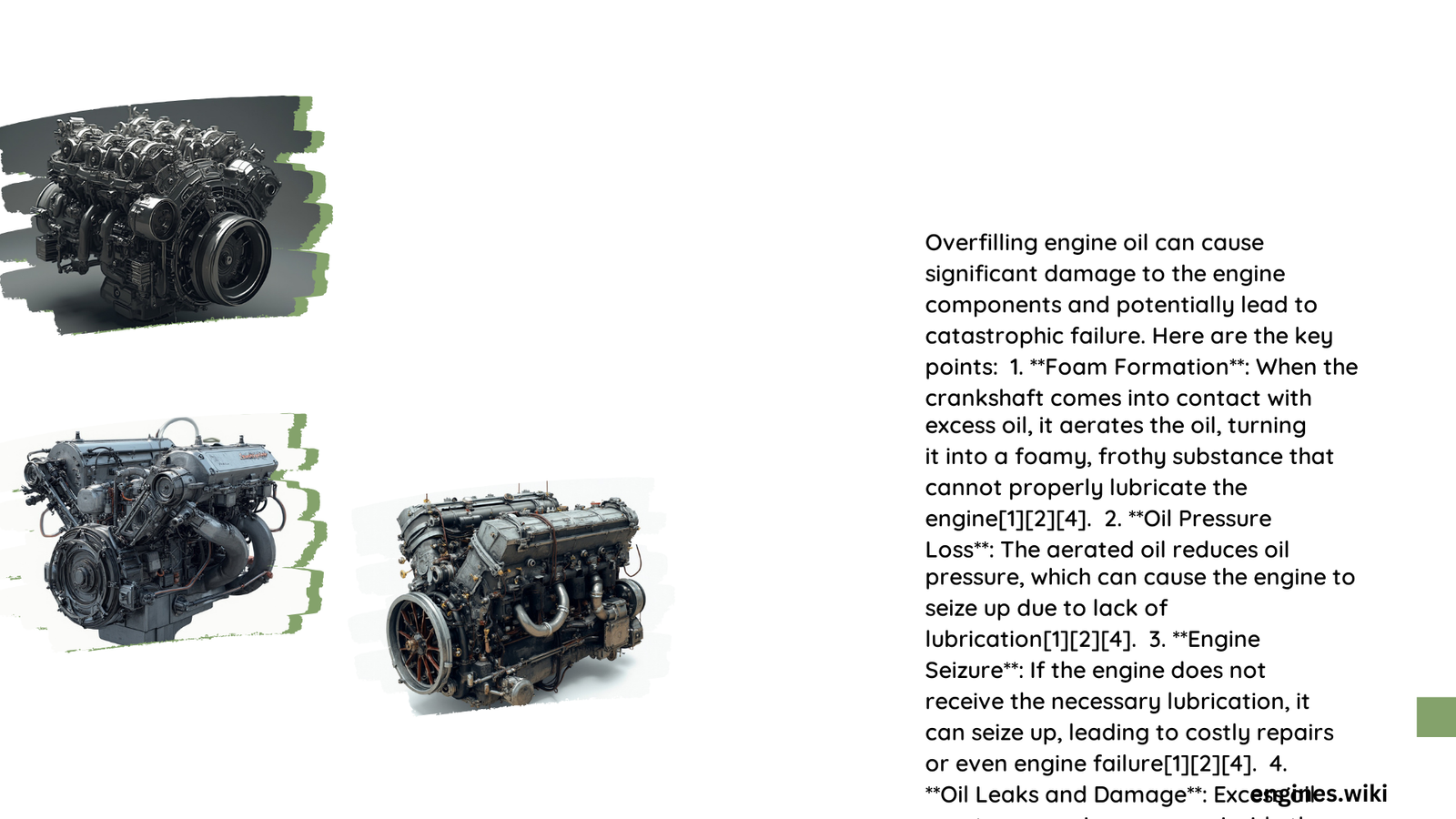Overfilling engine oil can lead to serious mechanical issues and potentially cause significant damage to your vehicle’s engine. Excess oil can interfere with normal engine operation, leading to increased pressure, foaming, and reduced lubrication. This can result in decreased performance, engine damage, and costly repairs. Understanding the risks and proper oil maintenance is crucial for vehicle longevity and performance.
What Are the Immediate Effects of Overfilling Engine Oil?
Overfilling engine oil beyond the manufacturer’s recommended level can have several immediate effects:
- Increased oil pressure
- Aeration and foaming of the oil
- Reduced lubrication efficiency
- Potential oil leaks
- Engine performance issues
These effects can manifest quickly, sometimes within a few hundred miles of driving with overfilled oil.
How Does Overfilled Oil Impact Engine Components?

Excess oil in the engine can affect various components:
- Crankshaft: The rotating crankshaft can whip the excess oil into a froth, reducing its lubricating properties.
- Piston Rings: Increased pressure can force oil past the piston rings into the combustion chamber.
- Catalytic Converter: Oil burning in the combustion chamber can contaminate and damage the catalytic converter.
- Oil Seals and Gaskets: Higher oil pressure can cause these components to fail, leading to leaks.
What Are the Long-Term Consequences of Engine Oil Overfill?
Long-term consequences of overfilling engine oil can be severe and costly:
- Engine Failure: In extreme cases, overfilling can lead to complete engine failure, requiring replacement.
- Reduced Engine Lifespan: Consistent overfilling can accelerate wear on engine components.
- Decreased Performance: Over time, the engine may experience a loss in power and efficiency.
- Increased Emissions: Oil burning in the combustion chamber can lead to increased harmful emissions.
How Can You Identify Overfilled Engine Oil?
Identifying overfilled engine oil is crucial for preventing damage. Here are key indicators:
- Oil level above the maximum mark on the dipstick
- White or blue smoke from the exhaust
- Check engine light illumination
- Unusual engine noises (knocking, tapping, or ticking)
- Decreased engine performance
- Visible oil leaks
What Are the Correct Oil Levels for Different Engine Types?
Proper oil levels vary depending on engine size:
| Engine Type | Approximate Oil Capacity |
|---|---|
| 3-cylinder | 3 liters |
| 4-cylinder | 4.5 liters |
| 6-cylinder | 5.5 liters |
| 8-cylinder | 4.5 to 7.5 liters |
Always consult your vehicle’s manual for the exact recommended oil capacity.
How Can You Prevent Overfilling Engine Oil?
Preventing oil overfill is straightforward with these steps:
- Refer to your vehicle’s manual for the correct oil capacity.
- Use the dipstick to check oil levels regularly.
- Add oil incrementally, checking the level after each addition.
- Ensure the vehicle is on level ground when checking oil.
- Allow the engine to cool before checking oil levels for accuracy.
What Should You Do If You’ve Overfilled Your Engine Oil?
If you’ve overfilled your engine oil, take these steps:
- Do not start the engine if possible.
- If the engine has been run, allow it to cool completely.
- Drain the excess oil using the drain plug or an oil extractor.
- Recheck the oil level using the dipstick.
- If unsure, consult a professional mechanic.
Can Overfilled Oil Cause Immediate Engine Damage?
Yes, overfilled oil can cause immediate engine damage in severe cases:
- Hydrolock: Excess oil entering the combustion chamber can cause the engine to hydrolock.
- Connecting Rod Damage: The increased resistance can lead to bent or broken connecting rods.
- Seal Failures: Immediate pressure increases can cause rapid seal and gasket failures.
These issues can occur within days or even hours of overfilling, depending on the severity.
What Are the Financial Implications of Overfilling Engine Oil?
The financial impact of overfilling engine oil can be significant:
- Repair Costs: Minor issues may cost hundreds, while major engine damage can run into thousands of dollars.
- Decreased Fuel Efficiency: Overfilled oil can reduce fuel economy, increasing long-term fuel costs.
- Potential Vehicle Replacement: In extreme cases, the cost of repairs may exceed the vehicle’s value.
How Does Overfilled Oil Affect Vehicle Warranties?
Overfilling engine oil can have implications for vehicle warranties:
- Some manufacturers may void warranties for damage caused by improper maintenance.
- Regular oil changes and proper filling are often required to maintain warranty coverage.
- Documented proof of proper oil maintenance may be necessary for warranty claims.
Always follow manufacturer guidelines to protect your warranty.
By understanding the risks and proper maintenance procedures, you can avoid the potentially costly and damaging effects of overfilling engine oil. Regular checks and adherence to manufacturer specifications are key to maintaining your vehicle’s performance and longevity.
References:
1. Shield Oils – What Happens if You Overfill Your Vehicle with Engine Oil? How To Fix It
2. Zeigler Ford ESP – What to Do If You Overfill Your Vehicle With Oil
3. TotalEnergies – What Happens When You Overfill Your Engine With Oil
